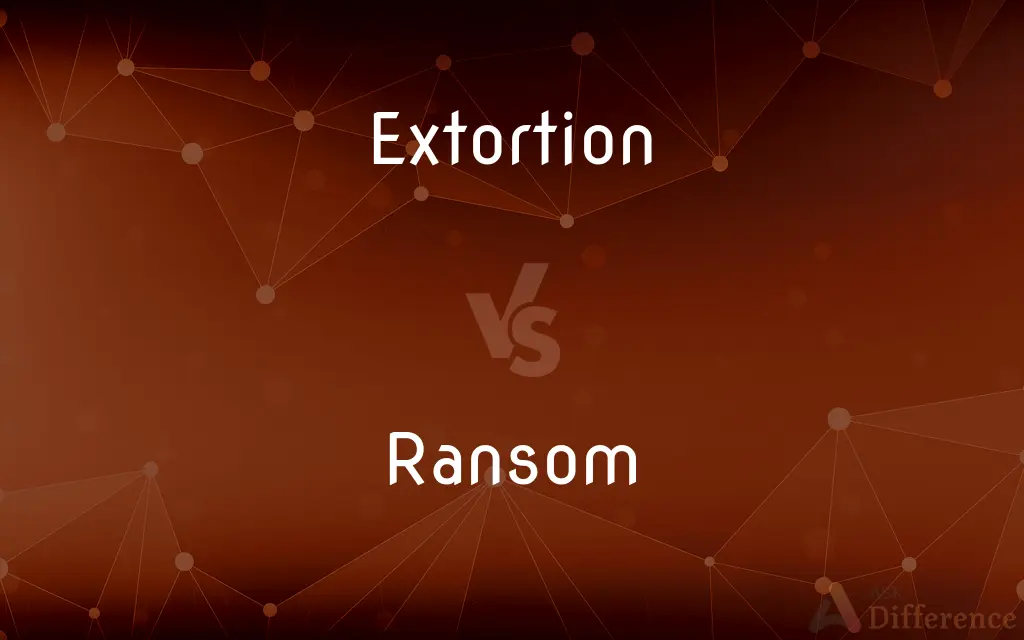Extortion vs. Ransom — What's the Difference?
By Tayyaba Rehman — Published on September 16, 2023
Extortion is the act of obtaining something, especially money, through force or threats, while ransom is the specific amount demanded or paid to release someone or something from captivity.

Difference Between Extortion and Ransom
Table of Contents
ADVERTISEMENT
Key Differences
Extortion refers to a broader, unlawful practice of obtaining money, property, or services from an individual or institution through coercion. This coercion can come in many forms, including threats of physical harm, damage to reputation, or legal action. On the other hand, ransom strictly pertains to the money or payment demanded or made for the release of a prisoner, kidnap victim, or stolen property.
While both extortion and ransom are related to obtaining something through forceful means, their context and focus differ. Extortion can happen in various circumstances and may not necessarily involve kidnapping or physical captivity. Ransom, however, always relates to a specific demand for the release of an individual or an object.
In some kidnapping cases, extortion can be the overarching crime, with the ransom being the specific amount or condition set by the kidnappers. Extortion acts as the umbrella activity, and the ransom becomes a subset or specific manifestation of that activity.
It's essential to note that while all ransoms can be considered extortion, not all acts of extortion are ransoms. For instance, a person might extort another by threatening to reveal embarrassing information unless paid, but this wouldn't be a ransom since no one is held captive.
Comparison Chart
Focus
Act of coercion.
Payment or demand for release.
ADVERTISEMENT
Context
Broad scenarios; not just kidnappings.
Specifically related to captivity.
Objective
Obtain money, services, or property.
Release a person or object from captivity.
Involvement
Can involve threats of various kinds.
Usually involves threat to a captive's well-being.
Relation
General act.
Specific type of extortion.
Compare with Definitions
Extortion
The illegal act of obtaining something through force or threats.
The businessman was arrested for his involvement in several extortion schemes.
Ransom
A sum of money demanded or paid for the release of a captive.
The kidnappers demanded a ransom of one million dollars.
Extortion
Unlawful extraction of money or property through intimidation or undue exercise of authority.
The corrupt officer was known for extortion from local shopkeepers.
Ransom
The act of freeing someone from captivity by paying a price.
The family was relieved after the ransom led to their daughter's safe return.
Extortion
A criminal act of taking something of value by force, threats, or abuse of authority.
The city was plagued by extortion rackets that targeted small businesses.
Ransom
Money or payment demanded for the redemption of a prisoner or goods.
The pirates seized the ship and set a high ransom for its crew and cargo.
Extortion
Coercion of money or something else of value from someone in response to threats.
She was charged with extortion after threatening to leak the company's secrets.
Ransom
Payment made to an abductor to release the person or property they are holding.
The wealthy businessman paid the ransom in unmarked bills, as instructed.
Extortion
Blackmailing someone into providing money, property, or services.
The scandal revealed an intricate web of deceit and extortion.
Ransom
Ransom is the practice of holding a prisoner or item to extort money or property to secure their release, or the sum of money involved in such a practice. When ransom means "payment", the word comes via Old French rançon from Latin redemptio = "buying back": compare "redemption".
Extortion
Extortion is the practice of obtaining benefit through coercion. In most jurisdictions it is likely to constitute a criminal offense; the bulk of this article deals with such cases.
Ransom
The release of property or a person in return for payment of a demanded price.
Extortion
The practice of obtaining something, especially money, through force or threats
He used bribery and extortion to build himself a huge, art-stuffed mansion
Extortion rackets
Ransom
The price or payment demanded or paid for such release.
Extortion
Illegal use of one's official position or powers to obtain property, funds, or patronage.
Ransom
(Christianity) A redemption from sin and its consequences.
Extortion
The act or an instance of extorting something, as by psychological pressure.
Ransom
To obtain the release of by paying a certain price.
Extortion
An excessive or exorbitant charge.
Ransom
To release after receiving such a payment.
Extortion
The practice of extorting money or other property by the use of force or threats.
Ransom
(Christianity) To deliver from sin and its consequences.
Extortion
The act of extorting; the act or practice of wresting anything from a person by force, by threats, or by any undue exercise of power; undue exaction; overcharge.
Ransom
Money paid for the freeing of a hostage.
They were held for two million dollars ransom.
They were held to ransom.
Extortion
The offense committed by an officer who corruptly claims and takes, as his fee, money, or other thing of value, that is not due, or more than is due, or before it is due.
Ransom
The release of a captive, or of captured property, by payment of a consideration.
Prisoners hopeless of ransom
Extortion
That which is extorted or exacted by force.
Ransom
A sum paid for the pardon of some great offence and the discharge of the offender; also, a fine paid in lieu of corporal punishment.
Extortion
An exorbitant charge
Ransom
(obsolete) To deliver, especially in context of sin or relevant penalties.
Extortion
Unjust exaction (as by the misuse of authority);
The extortion by dishonest officials of fees for performing their sworn duty
Ransom
To pay a price to set someone free from captivity or punishment.
To ransom prisoners from an enemy
Extortion
The felonious act of extorting money (as by threats of violence)
Ransom
To exact a ransom (payment) in exchange for the freedom of.
Ransom
The release of a captive, or of captured property, by payment of a consideration; redemption; as, prisoners hopeless of ransom.
Ransom
The money or price paid for the redemption of a prisoner, or for goods captured by an enemy; payment for freedom from restraint, penalty, or forfeit.
Thy ransom paid, which man from death redeems.
His captivity in Austria, and the heavy ransom he paid for his liberty.
Ransom
A sum paid for the pardon of some great offense and the discharge of the offender; also, a fine paid in lieu of corporal punishment.
Ransom
To redeem from captivity, servitude, punishment, or forfeit, by paying a price; to buy out of servitude or penalty; to rescue; to deliver; as, to ransom prisoners from an enemy.
Ransom
To exact a ransom for, or a payment on.
Such lands as he had rule of he ransomed them so grievously, and would tax the men two or three times in a year.
Ransom
Money demanded for the return of a captured person
Ransom
Payment for the release of someone
Ransom
The act of freeing from captivity or punishment
Ransom
Exchange or buy back for money; under threat
Ransom
A means to secure the release of a person or goods.
They quickly gathered the money, hoping the ransom would ensure his release.
Common Curiosities
Does Extortion always involve physical threats?
No, extortion can involve threats of various kinds, including reputational or legal threats.
Is Ransom only related to kidnapping cases?
Mostly, but it can also apply to objects or property held captive.
What is Extortion?
Extortion is the unlawful act of obtaining money, property, or services from someone through coercion.
How does Ransom differ from Extortion?
Ransom is a specific type of extortion where money or other payment is demanded for the release of a captive.
Is it always advised to pay the Ransom in kidnapping cases?
Not always; it depends on the situation and the advice of law enforcement.
Can Ransom be considered a form of Extortion?
Yes, ransom is a specific form of extortion.
Are both Extortion and Ransom considered crimes?
Yes, both are illegal acts in most jurisdictions.
What's the primary objective of Extortion?
To unlawfully obtain money, services, or property from someone.
What is the main goal of a Ransom?
To secure the release of a person or object from captivity.
How can one protect themselves from becoming a victim of Ransom or Extortion?
Taking security precautions, being wary of suspicious activities, and reporting threats to authorities can help.
Can Extortion occur without someone being physically held captive?
Yes, extortion can happen in various scenarios, not just in the context of physical captivity.
How prevalent is cyber Extortion and Ransomware?
It has become increasingly common, with cybercriminals targeting both individuals and institutions.
Can Extortion involve forcing someone to perform a service?
Yes, extortion can coerce someone into providing a service against their will.
Is there a legal way to deal with Ransom demands?
The approach varies by jurisdiction, but paying a ransom isn't always illegal, though engaging with criminals has risks.
Share Your Discovery

Previous Comparison
Confident vs. Arrogant
Next Comparison
Constant vs. VariableAuthor Spotlight
Written by
Tayyaba RehmanTayyaba Rehman is a distinguished writer, currently serving as a primary contributor to askdifference.com. As a researcher in semantics and etymology, Tayyaba's passion for the complexity of languages and their distinctions has found a perfect home on the platform. Tayyaba delves into the intricacies of language, distinguishing between commonly confused words and phrases, thereby providing clarity for readers worldwide.














































